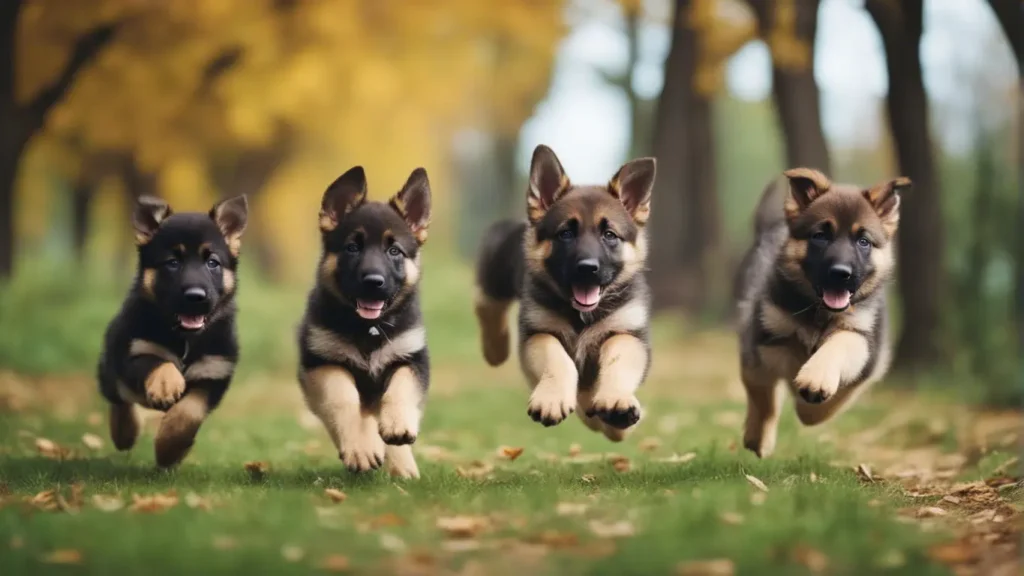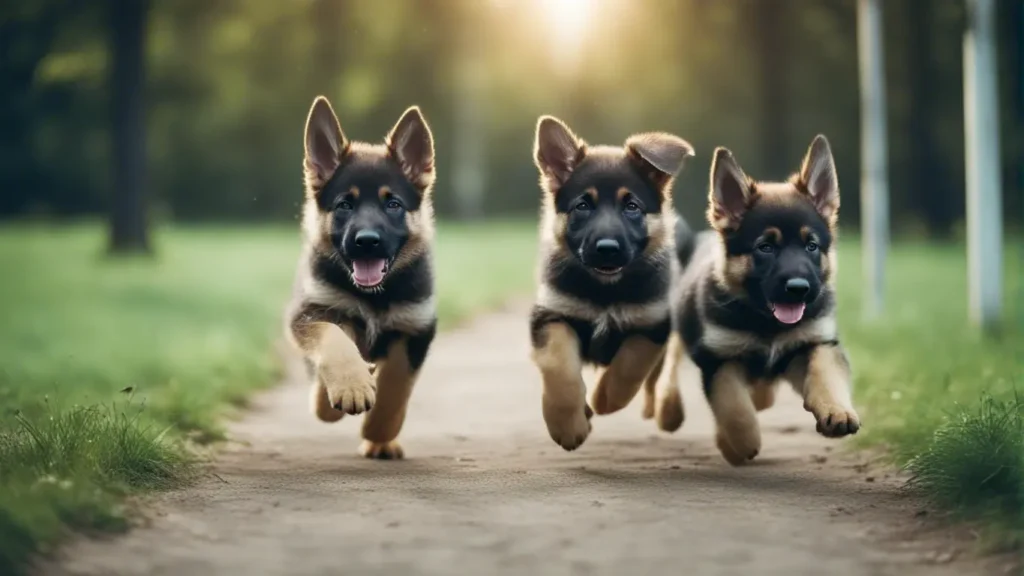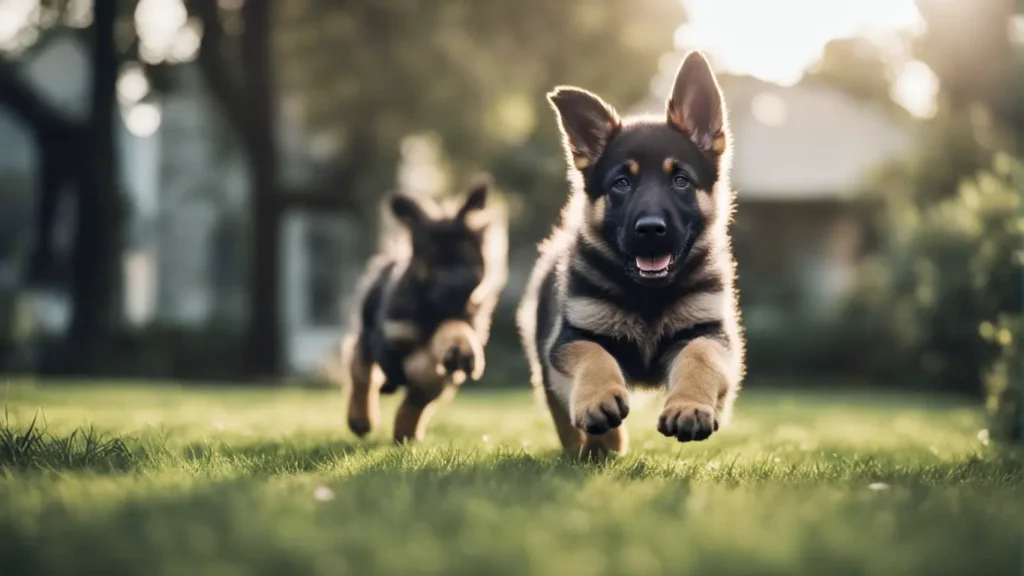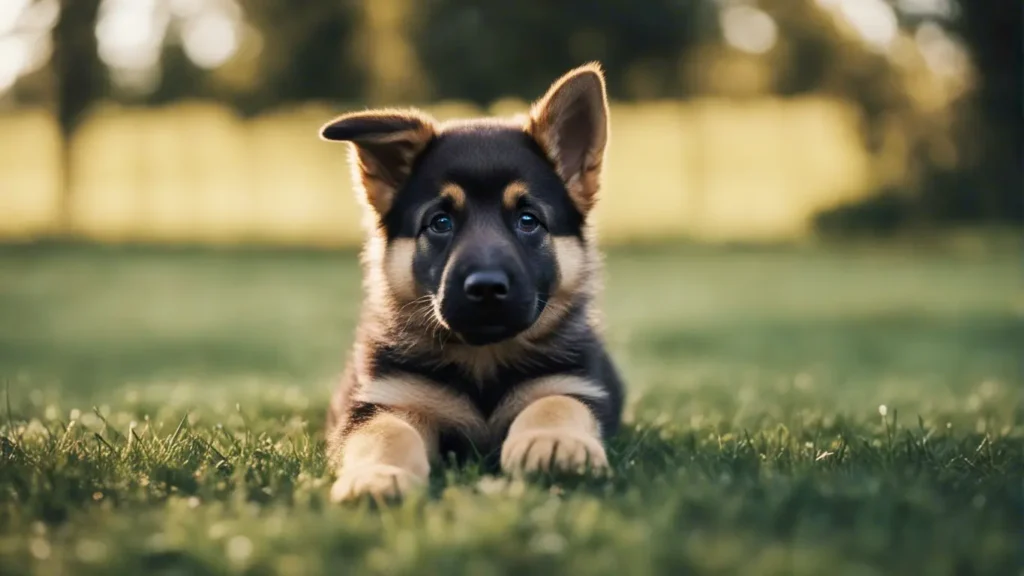Bringing a German Shepherd puppy into your home is an exciting journey filled with fun, love, and fur! But before you welcome one of these intelligent dogs into your family, it’s essential to understand what raising a German Shepherd puppy entails.
This comprehensive guide provides you with everything you need to know to be prepared for this rewarding yet demanding experience. We will explore German Shepherd characteristics, early training and socialization, health concerns, exercise needs, grooming requirements, and more. Equipped with this knowledge, you’ll be ready to embark on a lifelong bond with your German Shepherd companion.
Table of Contents
- 1 The Allure of the German Shepherd Puppy
- 2 Early Socialization and Training
- 3 Establishing a Bond Built on Trust
- 4 Exercise Needs for a Growing Pup
- 5 Grooming Essentials
- 6 Nutrition Fundamentals
- 7 Common Health Issues
- 8 Welcome Home, Your Loyal Companion
- 9 Related posts:
- 10 German Shepherd 101: Everything You Need to Know About This Popular Breed
- 11 Unveiling the Secrets of the Black German Shepherd
- 12 Long Hair German Shepherd: A Comprehensive Guide
- 13 German Shepherd Puppies (25 of the Cutest Pups)
The Allure of the German Shepherd Puppy
It’s easy to see why German Shepherd puppies capture the hearts of dog lovers everywhere. Their noble appearance, muscular build, erect ears, and moderately long muzzle exude confidence and poise. Despite their commanding presence, German Shepherd puppies have an irresistible charm evident in their unwavering loyalty and affection towards their owners.

These puppies grow into dogs renowned for their versatility, serving critical roles as police dogs, search and rescue workers, service animals, and devoted family guardians. Their keen intelligence makes them highly responsive to training, while their protective instincts lend a sense of security whether on a walk or at home.
The German Shepherd is ideal for active individuals and families looking for a steadfast friend and dutiful working dog. But starting early and laying a solid foundation through proper socialization, training, and care from the moment you bring your puppy home is critical.
- The German Shepherd dog breed was first registered with the American Kennel Club in 1908. This occurred soon after the breed was first developed in Germany in 1899.
- The AKC recognized the German Shepherd as a distinct breed in its own right and classified it within the Herding Group.
- According to AKC registration statistics, the German Shepherd consistently ranks among the most popular dog breeds.
- As of 2022, the German Shepherd ranks 2nd out of 197 breeds in popularity in the United States.
- It has held a top spot within the top 5 most popular breeds registered with the AKC for over a decade.
- At times, it has been the #1 most popular breed, including from 2009-2013. The Labrador Retriever displaced it from the top spot in recent years.
- The German Shepherd is admired for its versatility, intelligence, athleticism, work ethic, and loyalty, making it a popular choice for families, service dog work, law enforcement, and more. Its popularity endures due to these stellar qualities and attributes.

Early Socialization and Training
The most formative stage of a German Shepherd’s life occurs between 3 and 16 weeks of age. This is a crucial socialization period where they are most receptive to new experiences that will shape their future behavior and personality. Exposing your German Shepherd puppy to a wide range of sights, sounds, people, animals, and environments builds their confidence in unfamiliar situations.
Introduce your pup to the outside world gradually through short walks around your neighborhood. Let them interact with friendly, vaccinated dogs during supervised play sessions. Invite guests regularly so they become accustomed to strangers. Expose them to mundane noises like the vacuum cleaner, blender, and washing machine so these don’t startle them later.
Pair new experiences with ample rewards and praise so they develop positive associations. Remain calm and composed during exposures to prevent transferring any anxiety to your pup. These structured socialization experiences are invaluable in avoiding fearful or aggressive tendencies.

Beyond socialization, enrollment in puppy preschool provides early training essential for your German Shepherd. Classes utilize force-free, reward-based methods to teach good manners, obedience cues like sit and stay, leash walking skills, and impulse control. Your pup will receive mental stimulation and physical activity while learning to focus on you despite environmental distractions.
Establishing a Bond Built on Trust
Unlike some breeds satisfied with a sedentary lifestyle, German Shepherds thrive when engaged in activities challenging their intelligence and energy. Take your German Shepherd puppy on daily walks, play interactive games, and provide chew toys and puzzles. Include them in your everyday home activities as well.
Use rewards like treats, praise, and belly rubs during playtime and training exercises to reinforce desired behaviors. Phase out food rewards over time to avoid over-reliance on treats. Remain patient – progress takes persistence. Above all, never get physical or yell when they make mistakes. This erodes the trust between you.

With time and consistency, you will be amazed at how in sync you become. Watching your German Shepherd puppy actively look to you for guidance and approval will melt your heart. Investing in positive-based training creates a relationship built on mutual understanding and respect.
Exercise Needs for a Growing Pup
Providing adequate exercise is among the most essential responsibilities of raising a German Shepherd puppy. These high-energy dogs were developed for herding, requiring vigorous activity daily. Behavior issues can develop without sufficient outlets to expend their enthusiasm and strength.
During the first year, avoid rigorous exercise that places undue stress on developing joints and bones. Engage your puppy in free play and light activity broken up into multiple short sessions. Take them on slow leash walks around the neighborhood two to three times daily, gradually increasing distance as they age.

Once fully vaccinated, off-leash play in secured areas is excellent for burning energy. A spacious, fenced backyard works flawlessly, allowing room to run and explore without wandering off. Fetch is another superb game to enjoy together outdoors. Investing in puzzle toys stuffed with treats incentivizes mental and physical engagement.
After one year, when your German Shepherd is physically mature, ramp up activity levels. Take them on mile-long walks, bike as they trot, play spirited games of fetch, and introduce agility equipment like tunnels, hurdles, and teeter-totters. Whether outdoors or in, make exercise fun while strengthening your bond.
Grooming Essentials
The signature double coat of German Shepherds requires diligent upkeep through regular grooming. Their water-resistant outer coat and dense undercoat can become matted and dirty without proper care.
Brush your German Shepherd puppy at least twice to three times weekly to remove loose hair and distribute skin oils. Use a slicker brush for general grooming and an undercoat rake when they blow their coat during seasonal shedding. Always brush in the direction of hair growth.
Check and clean ears weekly using a veterinarian-approved cleanser to prevent infections. Brush teeth frequently with a dog-safe toothpaste to maintain good dental health. Clip nails as needed when you hear clicking on floors, taking care not to cut too short.

Give baths on an as-needed basis with a mild puppy or dog shampoo. Over-bathing strips the coat of natural oils. Schedule annual visits with a professional groomer for thorough haircuts and care. Proper grooming keeps your pup’s skin clean, nails trimmed, and teeth plaque-free.
Nutrition Fundamentals
Diet plays a monumental role in rearing a healthy German Shepherd puppy. Like all large breeds, they are prone to rapid growth spurts that must be supported through proper nutrition. Pay close attention to their caloric intake, ensuring adequate protein, fat, carbohydrates, vitamins, and minerals.
Feed your puppy three scheduled meals per day for the first six months. Split their recommended daily intake into morning, midday, and evening feeding. This maintains a constant energy supply to match their active lifestyle and growing metabolism.

At six months, switch to twice-daily feedings spaced roughly 12 hours apart to better align with adult feeding patterns. Provide unlimited access to clean drinking water to prevent dehydration. Partner with your veterinarian to find a nutritionally complete large-breed puppy diet appropriate for their age and weight. Avoid over or underfeeding.
Common Health Issues
While German Shepherds are a healthy, hardy breed, certain health conditions are prevalent. Foremost is hip dysplasia, a malformed hip socket causing lameness and arthritis. Responsible breeders screen breeding pairs to minimize the risk of passing this inherited defect to puppies.
German Shepherds are also prone to elbow dysplasia, digestive problems, allergies, ear infections, eye conditions, and immune disorders. Discuss incidence rates in your puppy’s lineage with the breeder and have their health screened by a veterinarian. Remain vigilant of any emerging issues.

With attentive care and routine vet checks, your puppy will likely enjoy a long, fulfilling life as your faithful companion. Monitor their weight, nutrition, exercise, grooming, and behavior consistently. Intervene immediately whenever anything seems off to keep them healthy and happy.
Welcome Home, Your Loyal Companion
The arrival of your German Shepherd puppy marks the start of a beautiful friendship built on unwavering loyalty. Shower them with patience, compassion, and guidance. Lay a solid training and socialization foundation. Through your care and commitment, they will blossom into self-assured, obedient dogs with protective instincts.
Each joyous milestone, from welcoming your puppy home to their first successful commands, cements the special bond only a German Shepherd can offer. They become both a source of pride and a cherished family member. Raising a German Shepherd puppy is deeply rewarding if demanding. Just remember, the effort invested makes for a companion who will love and support you for life.